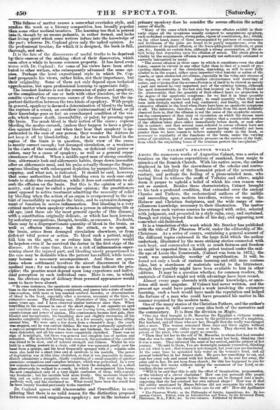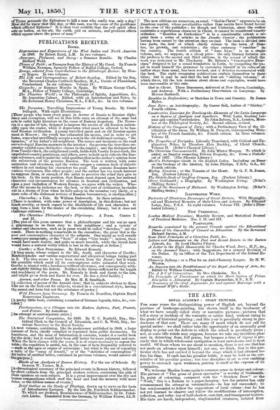CALMET'S PHANTOM WORLD. * AMONG the numerous works of Augustine Calmet,
was a. series of treatises on the various superstitions of mankind, from magic to 'flimsies of the Burnish Church.. With his native sense, the anther displayed in his book the shrewdness of the soholar. and centre- vertist, the credulity of the Romanist priest of the seventeenth century, and perhaps the feeling of a pious-minded man, who having lived to witness the scoffs of Voltaire and others, might deem it proper to uphold a belief of which his own reason was not so assured. Besides these characteristics, Calmet brought to his task a profound erudition, that extended over the ancient Classics and Fathers, the ecclesiastical authors of the middle and succeeding ages, modern. travellers, writers on magic,. the Hebrew and Christian Scriptures, and the wide range of mis- cellaneous knowledge necessary to their illustration. The matter drawn from such various sources he arranged with order, selected with judgment, and presented in a style calm, easy, and sustained, though not rising beyond the mode of his day, and appearing now
somewhat old-fashioned.
It is a translation of this work which Mr. Bentley has published
with the title of The Phantom World, under the editorship of Mr. Christmas. As a series of essays, containing a general account of the different topics embraced in. the large field which the author undertook, illustrated by the more striking stories connected with each head, and commented on with as much fairness and freedom as, could be expeeted from a Romish priest trained under the mid- dle age of Louis the Fourteenth, (Calmet was born. in 1672,) the work was undoubtedly worthy of republication. It will he found not only a book of curious learning and still more anxious. tales,. but a storehouse of materials useful to the litterateur, though they possibly might have been available to him in other editions. It may be a question whether, for common readers, the materials of Calmet might not with advantage have been recast. Almost every page abounds with singular knowledge, or anec- dotes eta] more singular. If Carnet had never written, and the present age could have produced a work involving the extensive learning, such a book would have made the reputation and helped the fortune of a man who could have presented his matter in.the manner required by the modern taste. One of the ninny stories of the Christian Fathers, and the author's remarks upon it, will convey some idea both of the narrative and
the commentary. It is from the division on Magic..
"One day they brought to St. Macarius the Egyptian a virtuous woman who had been transformed into a mare by the pernicious arts of a magician. Her husband, and all those who saw her, thought that she really was changed. into a mare. This woman remained thre.e days and three nights without tastmg any food proper either for man or horse. They showed her to the priests of the place, who could apply no remedy.
"Then they led her to the cell of St. Maearius, to whom God had revealed that she was to come his disciples wanted. to send her back, thinking that it was a mare. They informed the saint of her arrival, and the subject of her journey. 'He said to them, You are downright animals yourselves. thinking you see what is not : that woman is not changed, but your eyes are fascinated. At the same time he sprinkled holy water on the woman's head, and all present beheld her in her former state. He gave her something to eat, and sent her away safe and sound with her husband. As he sent her away, the saint said to her, Do not keep from church ; for this has happened to you for having been five weeks without taking the sacrament of our Lord, or at- tending divine service.' # • • "Will it be said that this is only the effect of imagination, prepossession, or the trickery of a clever charlatan ? How can you persuade fifty people that a woman who is present before their eyes can be changed into a mare, supposing that she has retained her own natural shape ? How was it that the soldier mentioned by 2Eneas Sylvius did not recognize his wife, whom he pierced with his sworn, and whose ears he cut off? How did Apollonius
• The Phantom World ; or the Philosophy of Spirits, Apparitions, he. By Au- gustine Carnet. Edited, with an Introduction and Notes, by the Reverend Henry Christmas, M.A., F.R.8., &c. In two volumes. Published by Bentley. of fiyana persuade the Ephesians to kill a man who really was only a dog How did lie know that this dog, or this man, was the cause of the pestilence which afflicted Ephesus ? It is then very credible that the evil spirit often acts on bodies, on the air, the earth, and on animals, and produces effects which appear above the power of man."'



























 Previous page
Previous page